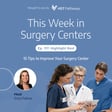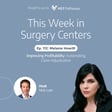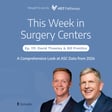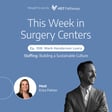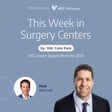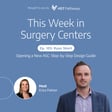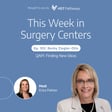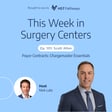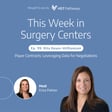Become a Creator today!Start creating today - Share your story with the world!
Start for free
00:00:00
00:00:01

Sayword Hill – Improving Patient Collections: Mastering Eligibility
In this episode, we’re kicking off a three-part series on Improving Patient Collections with Sayword Hill, SVP of Revenue Cycle at Constitution. Sayword shares valuable insights on mastering patient eligibility, ensuring you're not performing procedures on uninsured patients, and helping prevent claim denials.
In our news recap, we’ll cover the opening of a new cardiovascular ASC, the impact of Hurricane Milton on hospitals, how AI is easing the charting burden for nurses, and end on a heartwarming note with the story of conjoined twins who just celebrated their first birthday after a successful separation surgery.
Resources Mentioned:
- Bon Secours Mercy Health, Compass Surgical Partners, AlignedCardio to Open Cardiovascular ASC
- Hurricane Milton disrupts infrastructure, could trigger more hospital evacuations in Florida
- How AI could tame the charting madness for nurses
- Twin Boys Born Conjoined Celebrate 1st Birthday After Separation Surgery
- HST’s 2024 State of the Industry Report
- Learn more about HST Clariti, the solution Sayword and her team use to verify eligibility
Brought to you by HST Pathways.
Transcript
Introduction to Podcast and ASC Industry
00:00:01
Speaker
Welcome to This Week in Surgery Centers. If you're in the ASC industry, then you're in the right place. Every week, we'll start the episode off by sharing an interesting conversation we had with our featured guests, and then we'll close the episode by recapping the latest news impacting surgery centers. We're excited to share with you what we have, so let's get started and see what the industry's been up to.
Improving Patient Collections and Insurance Eligibility
00:00:27
Speaker
Hi, everyone. Here's what you can expect on today's episode. Sayward Hill is the SVP of Revenue Cycle at Constitution, and today she joins us to kick off our three-part series on improving patient collections. Sayward shared some excellent tips on how you can master eligibility so that you don't end up performing a procedure on a patient who is not covered, and also so your claims don't get denied down the road.
00:00:53
Speaker
In our news recap, we'll cover a new cardio ASC opening up, how hurricane Milton has impacted hospitals so far, how AI can help nurses with their charting, and of course, and the new segment with a positive story about conjoined twins who recently celebrated their first birthday after undergoing a successful separation surgery. Hope everyone enjoys the episode and here's what's going on this week in Surgery Centers.
00:01:24
Speaker
Say a word, welcome to the show. Thank you for having me. Excited for you to be here. Can you tell us a little bit about your role at Constitution? Sure. So at Constitution, I am the senior vice president of revenue cycle and I've been here for just a little over a year, but my role is to oversee all the coding billing services for all of our surgery centers here in the Northeast.
00:01:52
Speaker
And I specifically work with administrators, some of the front office managers, and then staff that we have both onsite and remotely. Fantastic. So you oversee all of revenue cycle at Constitution, it sounds like. And today for our conversation, we're going to focus in on the patient collections, the patient side of, of revenue cycle, which is sometimes overlooked, but obviously very important part of the overall equation.
00:02:21
Speaker
and specifically wanted to hone in on eligibility verification. So from your perspective, why is insurance eliibility eligibility verification an important part of the overall patient collection process? So insurance eligibility verification is number one step that has to take place just to verify that the patient truly has the insurance that we are being presented with that they have. It's obviously beneficial for us to know that they have an insurance, but it's beneficial for the patient as well that we understand what type of insurance they have, that when we're looking at it, that we have maybe contracts in place with the payer that's in question there. And then we're able to verify what the patient's eligibility is with it. Are they in network? Are they out of network?
00:03:13
Speaker
And that will impact what their out-of-pocket would be for their individual procedure. And as a patient, I always want to know that ahead of time, like what am I going to get myself into to have whatever procedure done? And it's our responsibility to make sure that we're communicating as effectively with our patients as possible, their responsibility. Got it. And so it sounds like from your perspective there, it's not just about knowing if they have coverage, which is important, but also you're talking about What type of coverage and what the responsibility is going to be? Absolutely. Absolutely. Especially this day and age where so much of the responsibility is put on us as a patient. There's so much more involved in that. We really need to have a good understanding of what their out of pocket is ahead of time and educate the patient on that. Sure. And when you run eligibility, when you look at it, ah what part of the patient life cycle do you do that?
00:04:14
Speaker
So when I'm looking at that, I'm looking at it from the time the patient is scheduled. It's the first time that you look at it is the best time. You don't want to wait. If a patient scheduled 10 days out, you don't want to wait.
00:04:28
Speaker
three days out to find out that maybe the patient doesn't have that insurance or that we're not contracted with that payer and then we're messing up a patient's scheduled time off to have that surgery. So verifying that that benefit and that coverage right at the time of scheduling initially is the best time to verify it and then always taking a look at it again prior to service because any of us can change jobs or it can go over the year and maybe our policy numbers changed. And so verifying that information within a day or two of service again is also important. Great. So it sounds like you you check it twice, right? At time of scheduling and right before service, which we've seen to be a best practice.
00:05:16
Speaker
We do see some that just do it at time of scheduling. Have you found that there's a benefit to doing it twice? How often does that come up? Yes. So I, anytime pretty much at the beginning of the year, you can see a big shift because that's usually when patient policies can change. But from month to month, some of the commercial, like the affordable care act plans, some of those can drop.
00:05:41
Speaker
A patient has Medicaid coverage that can drop, different plans can drop or change from month to month. And so it's really important that it's verified. In addition to that, when we're as patients, we're still seeing doctors, we're getting x-rays, MRIs done, there's different bills that are going out. So we may have scheduled this procedure three weeks ago. And by the time that the patient's coming to have surgery,
00:06:08
Speaker
they may have met their deductible or their full out-of-pocket max at that point with the services that they've had before then. So really reestablishing and verifying that benefit is very helpful. Cause if you don't, there are times where they will slip through and maybe they didn't have coverage, something lapsed, the patient didn't know it. And then we're in a situation where the patient becomes self-pay and that puts them in a difficult position and and also the surgery center in a difficult position.
00:06:38
Speaker
Sure. So that's interesting. And that you mentioned something there that hits on the details of what you're checking against. You mentioned that sometimes difference between pulling it the first time and the second time, the patient's deductible may be different. yeah So therefore the the portion that they're responsible for, because they may be in a different you place within their plan. Absolutely. That's interesting. For patients that are not eligible, what do you do when you find out that information?
00:07:08
Speaker
So whenever we determine that the patient isn't eligible, that's when we start asking questions. ah The first thing we do is we reach back to the physician group, make sure we got the information correctly from them. Sometimes the information that's flowed over was something that was what they had before and it really has been updated and we just need to get updated information. Otherwise we need to contact the patient to make sure that the eligibility is there. There are sometimes patients don't realize that there's been a change in their coverage or they didn't provide the correct information at the time, and then we're able to get updated information. And then if we then find that the patient doesn't have insurance, then you go through the steps of discovering if they're eligible for anything, if there's a financial assistance policy or anything that's available for them, or maybe they're eligible for other types of insurance, and we can start guiding them in that conversation as well.
Benefits of Early Insurance Verification
00:08:06
Speaker
Got it. Okay.
00:08:07
Speaker
And what what have you found is the benefit on patient collections of running this process, of running eligibility verification? Well, I think there's several benefits, but one big one, if I think of it from the patient's perspective, and there's no surprises for them. They're notified ahead of time. They know what to expect. I think one of the worst things that that we can do having stood there with a parent when they're sick and injured going in is they find out when they're checking in, you owe $2,000. They're already stressed out. They were unaware. If we can notify patients in advance, get give them time to understand what that is. If we need to set them up on a payment plan, if they can put a portion of that down, whatever our goals are there, we give them that opportunity. From a facility side of things,
00:08:59
Speaker
The benefit is huge. One, we communicated the information to, we may have actually started collecting on the account, which is very important because ah the balance for a patient has gotten higher through the years. It decreases our amount of AR. It decreases the amount of patient statements. It helps us with bad debt issues. So there's a lot of benefits to have that conversation on the front end because most of the time.
00:09:28
Speaker
it will result in some form of payment either then or as we move forward because of that initial communication versus if we wait until after the service, I have found that it decreases exponentially for us to be able to have that conversation with the patients and start the collection process.
00:09:49
Speaker
Yeah, I think that that seems to just make common sense too. When the consumer knows ahead of time what they're signed up for and what their responsibility to is and elects to move forward, that's different than being surprised after the fact in terms of the perception of of what you owe and your obligation to pay it. Absolutely. Yeah, I take it better on the front end than when I get that bill on the back end.
00:10:12
Speaker
Absolutely. And so you mentioned a couple of metrics there that this process can help with in terms of AR and increased collection of AR and and reduced bad debt. Have you seen any specific examples of centers that you've worked with at Constitution or elsewhere that improve the eligibility verification process and seen a corresponding kind of impact from that on those metrics?
00:10:37
Speaker
Oh yeah. So I have, I see an almost an immediate increase one and just verifying eligibility on all the patients, just getting through the volume of eligibility verification. You need to sometimes you can't get through it all. If you're manually doing it. And in that process, you might miss even a Medicare patient that lapsed in coverage for some reason, because of the part B.
00:11:03
Speaker
part of it and if they've lapsed in coverage then there's no services ASC setting. So I've seen benefits basically and less write-offs. due to denials, due to lack of eligibility being one of those. We've seen a substantial increase in collections just from one having a nice, a really accurate eligibility estimate come up, be available to us that we can communicate, whether it be via email, text, or on a call with a patient, and we can mail it to them if they want to see it on paper. It it increases how many patients we can touch
00:11:42
Speaker
in the conversations, which increases those collections. So I've seen two to three times ah increase in a monthly collection amount pretty quickly. While at the same time I see the increase in collections, I see a decrease in staff time spent on it. So I see it from two two areas. I see that the financial benefit to doing it, but I also see the the decrease in expense. And then we can have those people work in other areas that we're needing them to work in because they're spending less time on that. That's fantastic. And a 2 to 3x increase on the monthly collections is is obviously huge. And so it's a nice, nice bottom line impact. And as you mentioned, from a staff time perspective, freeing up staff time in terms of the bottom line impact, it sounds like focusing on this can be a no brainer.
Technology in Verification and Scheduling
00:12:36
Speaker
facilities. What I have heard from some facilities is, gosh though, checking two or three times on eligibility can be a lot, can be a lot of work, can take a lot of time. What role have you seen at Constitution, maybe software and automation play in the process to help with the multiple checks? Yeah. So based upon just standard eligibility software, I would not disagree with that concept, but When you have some more of the advanced software out there, it's automatically doing the eligibility check for you. So you're not doing any work associated with that. And what it does is it automatically will update it for you. And if they've dropped eligibility or there's been a change, it will show on the line items on your dashboard. I'll see it in red that something has changed.
00:13:27
Speaker
So when my dashboard, when I'm done, I've done the eligibility checks, I've moved forward, let's say with a data service 10 days ago. And it's doing that last minute eligibility check for me for for tomorrow. yeah Someone pops back on that list. They're only going to pop back on the list if that eligibility shifted, something changed. So the system's already doing it for me and it's presenting it right in front of my face to go, Hey, you may want to look at this, something changed. All I've got to do is click on it.
00:13:56
Speaker
and know what change, decide do I need to make a call or is this just informational and then I can finalize it again. It's really not any additional work and it saves a lot of time on the back end working the denial or potentially refunds to a patient or needing to collect more, any of those tasks that we do on the back end, we're saving that time by taking those few seconds to review that on the front end.
00:14:23
Speaker
Great. So the software is saving your staff time on the front end, making the calls, verifying the insurance, but also on the back end as well, which makes sense. Yes. Fantastic. Final question for you. And we do this every week with our listeners. What is one thing our listeners can do this week to improve their surgery centers?
00:14:46
Speaker
So obviously I come from the revenue cycle side. So one of the things that I consistently see that that we always watch is to have the surgery center really work with their physician groups on the scheduling process, making sure what CPT codes that they state their scheduling at the surgery center is actually the procedure that they end up performing. Because if the authorization is done on what they scheduled, which just happens to be a CPT code attached to the procedure. And it's not just right. It's the difference between you getting paid and getting denied because one digit off yeah could be just one digit off. So my suggestion is to spend just a little time with each of those surgery clinics and make sure that information is valid and it will decrease so many denial issues on the backend. Fantastic. I love that. And what one follow up for you, if I can.
00:15:46
Speaker
What have you found is the best time or place in the patient life cycle to to double check that CPT code at time of scheduling? So the best time to check that is prior to the patient actually having the surgery it for obvious reasons. But if we find that the patient actually has a different surgery, if you're doing that within 24 hours of the actual surgery being performed,
00:16:13
Speaker
invalidating or making adjustments to it. That is the best time to at least adjust an authorization if you have that opportunity. If you do need to adjust, time is of the essence on that. Yeah. But obviously if you work on the backend with it, you can look at your data for a timeframe. You can see trends.
00:16:32
Speaker
you can go back to your surgery center and say, hey, I need you to work with this clinic group. I'm noticing this CPT code versus this one. And then let's work with them. And it may just be updating the scheduling format. But for them, the office then can at least call the auth on the correct CPT code at that point. Fantastic. Sayward, thanks so much for joining us today. Thank you.
00:16:59
Speaker
As always, it has been a busy week in healthcare, so let's jump right in. Bonsacore Mercy Health, Compass Surgical Partners, and Aligned Cardio are collaborating to open a new cardiovascular ASC in Virginia. Set to open in late 2025, this 8,000 square foot facility will offer advanced cardio procedures to their community.
00:17:22
Speaker
The goal of the Short Pump Cardiovascular ASC is to provide high quality, safe and affordable care without requiring hospital stays. As Mike Lutz, president of Bonsacore Richmond Market, he explained, patients can expect excellent outcomes and a seamless experience at their new center.
00:17:42
Speaker
Compass Surgical Partners, which has developed over 250 ASCs, will bring its expertise in managing and building surgery centers ah through joint ventures with health systems like Bon Secours Mercy Health. The two have worked together since 2023 to expand outpatient surgical care, including opening the Springfield Regional Outpatient Surgery Center in Ohio earlier this year.
00:18:06
Speaker
Aligned Cardio, which is a physician-led organization, will make sure the center focuses on evidence-based cardiovascular care while helping reduce unnecessary healthcare care costs. The new center is also expected to be accredited by AAAHC.
00:18:20
Speaker
So this development is part of a larger trend for sure. ASCs are increasingly offering more complex procedures like those in the cardiovascular specialty. And of course, thanks to all this new technology, lots of lobbying and a push for cost-effective care, being able to perform cardio procedures and an ASC is becoming more and more common. HSC released our 2024 State of the Industry report a few weeks ago and We pulled out a few stats that were cardio specific. Just because it's such a hot topic right now, we wanted to see if there were any noticeable trends. In 2023, the average revenue per minute for a cardio procedure was one hundred roughly $104. Then in 2024, that revenue per minute increased 27% to $132.
00:19:13
Speaker
now There are several factors that influence that increase, including a decrease in the average OR duration per case. But I think it also highlights just this increased payer reimbursement and a shift in cases from inpatient to outpatient. So congrats to all involved with this new development and and it's called Short Pump Cardiovascular ASC. And I can't wait to hear all about your success.
Challenges and Innovations in Healthcare
00:19:39
Speaker
All right, as you all know by now, Hurricane Milton struck Florida's west coast as a category three storm, bringing with it heavy rain, tornadoes, and widespread power outages. I have been watching footage. I'm up in Connecticut and I've just been watching footage on TikTok and on the news. and It is really scary to see some of those the surges and the lightning and the tornadoes. So while hospitals in the region were well prepared, thanks to longstanding hurricane readiness plans, many are now facing critical infrastructure challenges. So disruptions to public services like water, sewage and electricity could force more patient evacuations in the coming days.
00:20:23
Speaker
Now I'm recording this Thursday, October 10th at 3.20 PM Eastern time. So hopefully by the time you listen to this on Tuesday or next week, all of the public services have been restored or at least are heading in that direction. But right now it's just really scary and and really sad for the patients who are in these healthcare facilities. Ahead of the Milton's landfall,
00:20:48
Speaker
Over 350 healthcare care facilities, including 16 hospitals, did evacuate patients. But now hospitals are being forced to make that decision of, do we have more evacuations? It really all depends on how quickly these public utilities can be restored. Thankfully, it seems like most of the hospital buildings sustained little damage. Again, it's just the water, electricity, personnel, making sure that everyone can keep themselves and patients safe.
00:21:14
Speaker
Florida hospitals have been managing ongoing challenges, including debris from Hurricane Helene, which was just a few weeks ago. They're already dealing with these supply chain disruptions caused by that storm damage. And especially, I think there was an IV solution plant in North Carolina that got hit pretty hard. And it's interesting, this article shared how HCA has 20% of its total beds in Florida. So they're expected to face significant financial impacts from this, although hopefully insurance will cover most of it.
00:21:43
Speaker
Okay so as hurricanes increase in frequency and intensity though, hospitals are investing more in preparedness and surgery centers should be as well. It just really underlines the need for kind of that continued investment in disaster readiness and community partnerships too so that you can maintain patient care to the best of your abilities during these natural disasters.
00:22:05
Speaker
Now our situation is obviously much different than inpatient hospitals who have patients that they're caring for throughout the night and around the clock. But I'm sure all of you felt the effects of needing to cancel these surgeries, make sure your staff is okay, make sure your facilities are okay. So of course to all the healthcare care workers and patients impacted by Hurricane Milton, we're thinking of you and I just hope things can return to normal as soon as it's safe to do so. All right.
00:22:33
Speaker
Switching gears, so as we have talked about a bunch, AI can really be a game changer for the surgery center industry, especially for nurses burdened by relentless charting and documentation.
00:22:45
Speaker
Even if you're electronic charting, which hopefully most of you are, it's a much more seamless and easier experience than paper charting, but it is still a lot of work to chart ah for every single patient that comes through. So, Hadassah Backman is a nurse and CEO at GuardDoc, which is a clinical data integrity company, and they believe that AI could revolutionize how nurses manage their workloads, allowing them to focus more on patient care.
00:23:12
Speaker
So she was saying that she sees AI as a tool to improve accuracy, reduce charting errors, and help nurses maintain compliance, which would ultimately benefit the patient and the organization. Backman had also said, drawing from her experience as an yeah ER and a hospice nurse, she really highlights AI's potential to cross-check charts, flag issues, and just reduce that administrative load. Mercy Health's chief nurse executive, Betty Jo Raccio,
00:23:40
Speaker
also supports AI's role in improving nursing workflows, citing increased staff retention and millions of dollars saved through AI-driven initiatives. And I thought that staff retention piece was really interesting because I feel like the idea of AI, I don't want to say it's going to scare people away, but I think it's just going to be one of those, ah just another hurdle we all have to learn and a new way of life to adapt to.
00:24:06
Speaker
But I think because the just with all the staffing shortages going on, these tools, once you get in there, can absolutely do everything that both of these women have mentioned, which was reduce that administrative load. So these nurses that were previously dealing with a tremendous amount of burnout doing just due to their the nature of their job and also staff shortages now have this assistant built in.
00:24:30
Speaker
So it's not a perfect solution, but I did think it was interesting that she said it helped increase staff retention. and Early trials of AI in this and clinical risk management have shown promising results, including a 50% reduction in charting errors per nurse and a dramatic improvement in compliance.
00:24:49
Speaker
For the surgery center industry, what does this mean? Adopting AI can just mean more efficient operations for you, so better compliance, ultimately improved patient care, and so much more. And as it continues to evolve, ASCs and other providers may find AI just to be that key tool in solving critical staffing and workflow challenges.
00:25:11
Speaker
And to end our new segment, on a positive note, twin brothers Amari and Javar, born conjoined, recently celebrated their first birthday after undergoing a successful separation surgery. So the boys who are from Philadelphia were born on September 29, 2023, sharing part of their sternum, diaphragm, abdominal wall, and liver.
00:25:34
Speaker
And then on ah August 21st, 2024, a team of more than two dozen specialists at the ah Children's Hospital of Philadelphia performed an eight-hour surgery to separate the twins. Their abdomens were reconstruction reconstructed using layers of mesh and advanced plastic surgery techniques.
00:25:55
Speaker
And the boys finally got to go home to join their parents and their siblings. And Shanika, their mom said seeing them in their own beds was an indescribable feeling. It feels like the beginning of a new journey as a family of six. And as always, I will include the, all the links to these articles in the episode notes, but I highly recommend checking it out. The two of them are so sweet. They're so cute. And I'm so happy that thanks to all the doctors at the Children's Hospital of Philadelphia, this family gets a new chapter.
00:26:26
Speaker
And that officially wraps up this week's podcast.
Conclusion and Next Episode Teaser
00:26:29
Speaker
Thank you as always for spending a few minutes of your week with us. Make sure to subscribe or leave a review on whichever platform you're listening from. I hope you have a great day and we will see you again next week.

